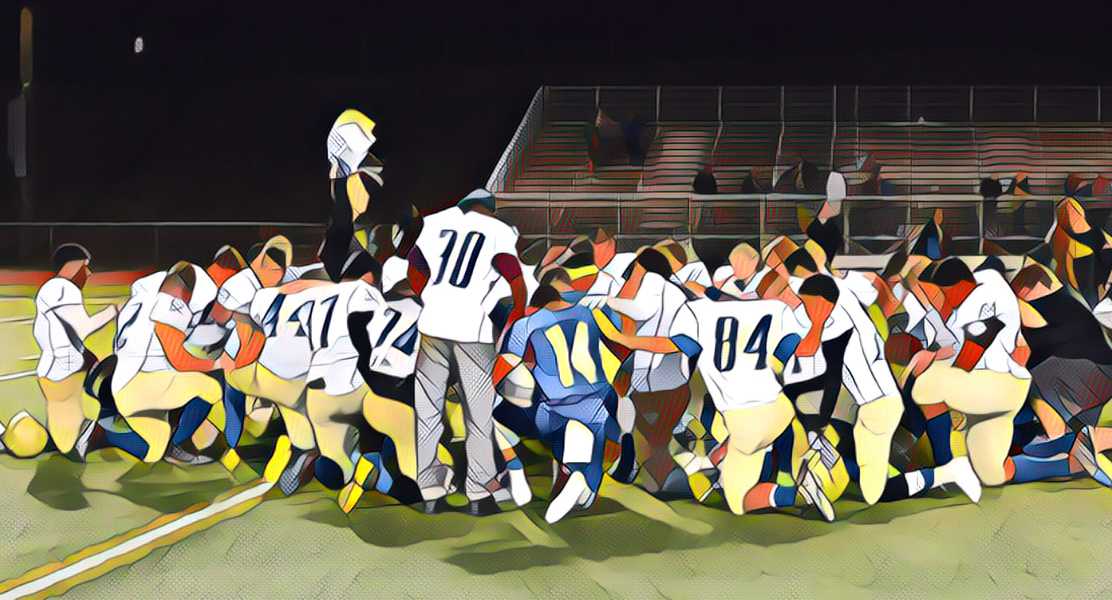Supreme Court considers high school football coach prayer case in ‘startling’ oral arguments

This week, the U.S. Supreme Court heard oral arguments in a closely watched church-state case that could have a big impact on protecting public school students from pressure by teachers and school officials to participate in religious activity. Kennedy v. Bremerton School District involves a public school district’s attempts to safeguard religious freedom by prohibiting a high school football coach from taking to the 50-yard line immediately after games to pray out loud.
Coach Joseph Kennedy claims such restrictions violate his right to exercise his religion. But in a brief filed with the Court, BJC explained the importance – long upheld by previous court decisions – of protecting public school students. After the oral arguments, BJC General Counsel Holly Hollman expressed her concern that the Court appears willing to reopen significant questions surrounding religion and public schools:
It was startling to hear the Supreme Court even consider whether public school officials can use their government position to lead religious exercises when this has been a settled question for decades. Our Constitution protects the religious liberty of students by keeping the government from sponsoring or denigrating religion.
During the hearing, justices sparred with attorneys over the facts of the case, but also over the correct way to frame and understand the legal issue. After several minutes discussing whether Kennedy was engaging in government speech as a public school employee on the job or private speech as an individual who just happened to be on the football field, Justice Elena Kagan rightly attempted to re-focus the debate, emphasizing the impact of the coach’s activities on students. Here is a highlight from that portion of the argument, in which Justice Kagan questions Kennedy attorney Paul Clement, who seemed to acknowledge that there are at least some lines a coach should not cross:
JUSTICE KAGAN: [I]f you look at our prayer cases, the idea of why the school can discipline him is that that puts a kind of undue pressure, a kind of coercion on students to participate in religious activities when they may not wish to, when their religion is different or when they have no religion. . . .
You see, I think a lot of this [government speech] stuff is … just not getting to the heart of what we care about, what our cases have long cared about in thinking about these questions, which is coercion on students and having students feel that they have to join religious activities that they do not wish to join, that their parents do not wish them to join.
…
So let me give you a hypothetical. So the hypothetical is you have a coach and he has historically been giving prayers in his post-game talk. And then the school says don’t do that…because we think it poses a coercion problem. And he says, okay, I won’t do that. And — but instead he says, you know what, I’m going to start the post-game talk a minute later than I usually do, and in the meantime, I’m going to pray, and, please, you know, join me if you’re so moved. What’s a student to think at that point?
MR. CLEMENT: I think, in that hypothetical, the — there well may be a coercion concern, but if instead the coach says, all right, I’m going to go to midfield, I’m going to do this at 15 seconds, I’m going to try to pick a time when most of the players are in the end zone doing something else, and if anybody asks whether they can join, I’m going to tell them it’s a free country, you don’t have to, but do what you want, that’s this case. And that’s not coercion that counts under the Establishment Clause.
JUSTICE KAGAN: So is that the question of this case, whether the facts are my facts or your facts?
MR. CLEMENT: That’s one of the questions in this case…
You can read the transcript here. For more, tune in to this week’s Respecting Religion podcast, where Holly and BJC Executive Director Amanda Tyler will share their reactions to what was said in the courtroom.
In addition to the jeopardy this case appears to pose to public school students and their parents, several justices in their questions seem to have designs on scrapping the legal test (called the “Lemon test”) that has long aided courts in determining whether government officials have violated the Establishment Clause in a variety of contexts; the Lemon test has also provided guidance to government officials in developing policies and procedures to ensure that they safeguard against encroaching on the institutional separation of church and state.
Whether the Supreme Court in this case attempts to craft a ruling that is narrow and based on the specific facts of the case (as they have tried to do in other recent church-state cases) or seeks to overhaul this area of the law more broadly remains to be seen, and it will determine the impact and legacy of this case. A decision is expected by the end of June.




